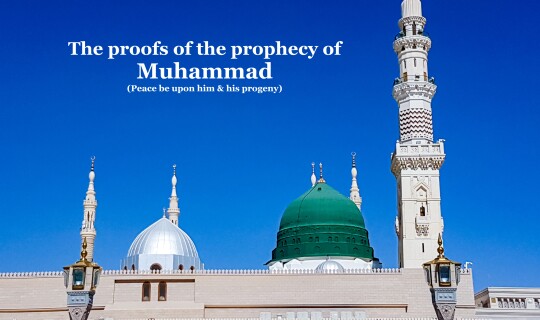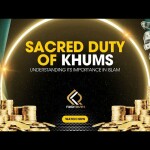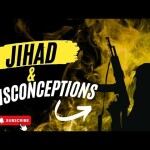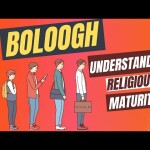- Islam and the Prophet's Connection to the Bible
- References in the Bible about the Coming of the Prophet Muhammad
- Bible Prophecies about the Advent of Muhammad
- Blessings of Ishmael and Isaac
- Muhammad: The Prophet Like Unto Moses
- The Awaited Prophet was to Come from Arabia
- Muhammad's Migration from Makkah to Madinah: Prophesied in the Bible?
- The Qur'an Foretold in the Bible?
- That Prophet - PARACLETE - Muhammad
- Was the Shift of Religious Leadership Prophesied?
- Out of Context Coincidence?
Question: Does Islam and its Prophet and Messenger Muhammad (peace and blessing of God be upon him) have any historical links with the Bible (Gospel and the Old Testament)?
(All quotations are from the New King James Version.)
Yes, indeed there are many links. We quote as follows:
- In the Old Testament, Genesis, 21:21 it is said: "He (Prophet Ishmael) dwelt in the Wilderness of Paran; and his Mother took a wife for him from the land of Egypt."
- Psalm 83: 4-6 talks about the enemies of among others Ishmaelites, and Hagrites (Hagar being the mother of Prophet Ishmael).
- Psalm 84: 4-6 "4. Blessed are those who dwell in your House; They will still be praising You. 5. Blessed is the man whose strength is in You, whose heart is set on the pilgrimage. 6. As they pass through the valley of Baca. They make it a spring; The rain also covers it with pools."
There are several interesting points in the above verses. The name Baca could be Hebrew whereas the word Makkah is Arabic. Added to this the fact that there is a designated House of God built by Abraham, peace be upon him, in Makkah where yearly pilgrimage was performed from the time of Abraham and Ishmael, peace be upon them both, even to this day. The valley of Baca could indeed be the same as the valley of Makkah. The above verses seem to place Hagar, Ishmael and their children in the valley of Makkah where Prophet Muhammad, peace and blessing of God be upon him, was born.
- Isaiah, 21:12-17 mentions "12 ... In the forest in Arabia you will lodge ... 15 For they fled from the swords , from the drawn sword, from the bent bow, and from the distress of war." (Probable connection with the enemies mentioned in Psalm 83: 4-6 quoted above; also settlement in Arabia is confirmed; the verse 16 which follows, also confirms these verses are about Ishmaelites, Kedar being the 2nd son of Prophet Ishmael).
- "16. For thus the Lord ... all the glory of Kedar will fall. 17. And the remainder ... people of Kedar will be diminished ... "
- Isaiah 42:1-13 - These are very moving verses about "God's elect servant" who will bring forth justice to the Gentiles. A point worth noting is that Gentiles are the non-Jews and it was confirmed by Jesus, peace be upon him, that he was sent to the Jews. Moreover Muhammad, peace and blessings of God be upon him, is consistently named by God as Mustafa which means 'elected' and 'Abd' which means 'servant'. Prophet Muhammad always referred to himself consistently as the 'Servant of God'. The above verses cannot be about Jesus, peace be upon him, as many Christians believe, for at least two reasons. Firstly, the Christians and the Catholics describe him as the son of God and not the servant of God; whereas Prophet Muhammad is known exclusively as the Servant and the Messenger of God. Secondly, Jesus was sent exclusively to the Jews whereas Prophet Muhammad was sent among the Gentiles.
References in the Bible about the Coming of the Prophet Muhammad
Question:Â Are there any references and citations from the Bible about the Coming of the Prophet Muhammad (peace and blessings of God be upon him)?
Yes. There are several citations in the Bible prophesying the coming of Prophet Muhammad, peace and blessing of God be upon him. Isaiah 42:4 says, "He will not fail nor be discouraged, till he has established justice in the earth." The Ministry of Jesus, peace be upon him, lasted only three years and at the time of his departure from this world it could not be truthfully said that 'he established justice in the earth'. However, Prophet Muhammad, peace and blessings of God be upon him, preached for 23 years and most certainly 'established justice in the earth' before he departed from the earth. It is therefore reasonable to conclude that verses 1-13 refer to the coming of Prophet Muhammad, peace and blessings of God be upon him.
Deuteronomy 18:18 "I will raise for them a Prophet like you (Moses) from among their brethren and will put My words in his mouth, and he shall speak unto them, all that I command him."
Let me make some comments about the above: Christians believe that this is a reference to Jesus, peace be upon him. One important word here is "Prophet". Christians believe Jesus is the son of God not a prophet of God. Another important word is "brethren". If it were Jesus the word would have been "children" because Jesus, peace be upon him, came from the children of Isaac. Since Ishmael, peace be upon him, was the brother of Isaac, peace be upon him, the reference is therefore to the children of Prophet Ishmael, peace be upon him, who will be brethren to the children of Isaac, peace be upon him. Again the only Prophet from the brethren of the Jews and the Christians was Prophet Muhammad, peace and blessings of God be upon him. The next important phrase is " ... like you (Moses)". Even a cursory comparison will show us that Jesus, peace be upon him, was very unlike Prophet Moses, peace be upon him. Prophet Moses' birth was natural whereas the birth of Jesus was miraculous without a father, to a virgin, peace be upon her. Prophet Moses married and had children, Jesus did not marry and of course did not have any children. The ministry of Jesus, peace be upon him, lasted three years and did not see the laws of God establish in his time. Prophet Moses, peace be upon him, preached the law of God for many decades and saw in his time, the law of God established. Comparing Prophet Moses, peace be upon him, with Prophet Muhammad, peace and blessings of God be upon him, brings out an amazing similarity. Muhammad's birth was natural, he was married and had children; preached the law of God for 23 years and saw in his own time God's Law established in his land.
The phrase: "I will put My words in his mouth", takes on great significance because Prophet Muhammad, peace and blessings of God be upon him, was unlettered; he did not know how to read or write. Normally God would put the message in the Prophet's mind. In this case attention is drawn towards "words" being put into the "mouth". Prophet Muhammad's sayings as well as eye witness accounts describe his receiving the verses of the Holy Qur'an, and his tongue moving with the words being put in his mouth.
Turning to the New Testament, let us look at John 14:15-16. It says: "15. If you love Me, keep My commandments. 16. And I will pray the Father, and He will give you another 'comforter' (helper in other versions), that he may abide with you forever." Also John 15:26-27, John 16:5-8 and John 16:12-14.
Jesus, peace be upon him, spoke the Gospel in his native language which is Aramaic. The earliest translations were in Greek. It is very very interesting that the Greek word which was eventually translated into English as "Comforter" (Helper) is "Parqaleeta" and the meaning of this word is "one whom people praise exceedingly". It does not mean "the Holy Ghost" which is what we are told the so called "Comforter" means. I do not have the slightest clue as to how this meaning was given to the word Parqaleeta. What is even more fascinating is the fact that the name Muhammad has exactly the same meaning as Parqaleeta "one whom people praise exceedingly"! One of my friends wrote very beautifully in his book about the meaning of the word Muhammad: "The most praised one. He is praised upon earth and in the heavens, from the beginning to the end, by men jinn and angels, rocks and trees and animals, by prophets before him since Adam, by saints until Doomsday. As all of this cannot give him due praise, we beg God to praise him. He is the only One who truly knows the value and the mystery of His Muhammad and He is the only One who can truly praise him." The celestial name of Prophet Muhammad, peace and blessings of God be upon him, is Ahmad. I will quote from the Holy Qur'an about the connection of Prophet Muhammad with the Bible as follows:
"And remember Moses said to his people: 'O my people! why do ye vex and insult me though ye know that I am the apostle of Allah (sent) to you?' Then when they went wrong Allah let their hearts go wrong: for Allah guides not those who are rebellious transgressors.
"And remember Jesus the son of Mary said: 'O Children of Israel! I am the Prophet of Allah (sent) to you confirming the Law (which came) before me and giving glad Tidings of a Prophet to come after me, whose name shall be Ahmad.' But when he came to them with Clear Signs they said 'This is evident sorcery!' "
Al-Qur'an 61:5-6
Allah is one of the 100 names of the One and only God. Allah is the name of His Essence while the other 99 are the names of His Attributes.
As for "abide with you forever" since Prophet Muhammad is the final Prophet and the Holy Qur'an the final Testament and Revelation from God, his teachings which are more or less the same as of all the other Prophets and Messengers of God, Divine teachings of God, he will abide in his teachings forever.
Bible Prophecies about the Advent of Muhammad
Abraham is widely regarded as the Patriarch of monotheism and the common father of the Jews, Christians and Muslims. Through his second son, Isaac, came all Israelite prophets including such towering figures as Jacob, Joseph, Moses, David, Solomon, and Jesus. May peace and blessings be upon them all. The advent of these great prophets was in partial fulfillment promise to bless the nations of earth through descendants of Abraham (Genesis 12:2-3). Such fulfillment is wholeheartedly accepted by Muslims whose faith considers the belief in and respect of all prophets an article of faith.
Blessings of Ishmael and Isaac
Was the first born son of Abraham (Ishmael) and his descendants included in God's covenant and promise? A few verses from the Bible may help light on this question:
- Genesis 12:2-3 speaks of God's promise to Abraham and his descendants before any child was born to him.
- Genesis 17:4 reiterates God's promise after the birth of Ishmael and before the birth of Isaac.
- In Genesis, Ch. 21, Isaac is specifically blessed but Ishmael was also specifically blessed and promised by God to become a "great nation" in Genesis 21:13,18.
- According to Deuteronomy 21:15-17 the traditional rights and privileges of the first born son are not to be affected by the social status of the mother (being a "free" woman such as Sarah, Isaac's mother, or a "Bondwoman" such as Hagar, Ishmael's mother). This is only consistent with the moral and humanitarian principles of all revealed faiths.
- The full legitimacy of Ishmael as Abraham's son and "seed" and the full legitimacy of his mother, Hagar, as Abraham's wife are clearly stated in Genesis 21:13 and 16:3. After Jesus, the last Israelite prophet, it was time that God's promise to bless Ishmael and his descendants be fulfilled. Less than 600 years after Jesus, came the last messenger of God, Muhammad, from the progeny of Abraham through Ishmael. God's blessing of both of the main branches of family tree was now fulfilled. But is there additional corroborating evidence that the Bible did in fact foretell the advent of prophet Muhammad?
Muhammad: The Prophet Like Unto Moses
Long time after Abraham, God's promise to send the long awaited Messenger was repeated this time in Moses' words. In Deuteronomy 18:18, Moses spoke of the prophet to be sent by God who is:
- From among the Israelite's "brethren", a reference to their Ishmaelite cousins as Ishmael was the other son of Abraham who was explicitly promised to become a "great nation".
- A prophet like unto Moses. There were hardly any two prophets who were so much alike as Moses and Muhammad. Both were given comprehensive law code of life, both encountered their enemies and were victors in miraculous ways, both were accepted as prophets/statesmen and both migrated following conspiracies to assassinate them. Analogies between Moses and Jesus overlooks not only the above similarities but other crucial ones as well (e.g. the natural birth, family life and death of Moses and Muhammad but not of Jesus, who was regarded by his followers as the Son of God and not exclusively a messenger of God, as Moses and Muhammad were and as the Muslims belief Jesus was).
The Awaited Prophet was to Come from Arabia
Deuteronomy 33:1-2 combines references to Moses, Jesus and Muhammad. It speaks of God (i.e. God's revelation) coming from Sinai, rising from Seir (probably the village of Sa'ir near Jerusalem) and shining forth from Paran. According to Genesis 21:21, the wilderness of Paran was the place where Ishmael settled (i.e. Arabia, specifically Makkah). Indeed the King James Version of the Bible mentions the pilgrims passing through the valley of Ba'ca (another name for Makkah) in Psalms 84:4-6. Isaiah 42:1-13 speaks of the beloved of God. His elect and messenger who will bring down a law to be awaited in the isles and who "shall not fail nor be discouraged till he have set judgement on the earth." Verse 11 connects that awaited one with the descendants of Ke'dar. Who is Ke'dar? According to Genesis 25:13, Ke'dar was the second son of Ishmael, the ancestor of prophet Muhammad.
Muhammad's Migration from Makkah to Madinah: Prophesied in the Bible?
Habakkuk 3:3 speaks of God (God's help) coming from Te'man (an Oasis North of Madinah according to J. Hasting's Dictionary of the Bible), and the holy one coming from Paran. That holy one who was under persecution migrated from Paran (Makkah) to be received enthusiastically in Madinah was none but prophet Muhammad. Indeed the incident of the migration of the prophet and his persecuted followers is vividly described in Isaiah 21:13-17. That section foretold as well about the battle of Badr in which the few ill-armed faithful miraculously defeated the "mighty" men of Ke'dar, who sought to destroy Islam and intimidate their own folks who turned to Islam.
The Qur'an Foretold in the Bible?
For twenty-three years, God's words (the Qur'an) were truly put into Muhammad's mouth. He was not the "author" of the Qur'an. The Qur'an was dictated by Angel Gabriel who asked Muhammad to simply repeat the words of the Qur'an as he heard them. These words were then committed to memory and to writing of those who hear them during Muhammad's lifetime and under his supervision. Was it a coincidence that the prophet "like unto Moses" from the "brethren" of the Israelites (i.e. from the Ishmaelites) was also described as one in whose mouth God will put His words and that he will speak in the name of God (Deuteronomy 18:18-20). Was it also a coincidence the "Paraclete" that Jesus foretold to come after him was described, as one who "shall not speak of himself, but whatsoever he shall hear, that shall he speak" (John 16:13).
Was it another coincidence that Isaiah ties between the messenger connected with Ke'dar and a new song (a scripture in a new language to be sang unto the Lord (Isaiah 42:10-11). More explicitly, prophesies Isaiah "For with stammering lips, and another tongue, will he speak to this people" (Isaiah 28:11). This latter verse correctly describes the "stammering lips" of Prophet Muhammad reflecting the state of tension and concentration he went through at the time of revelation. Another related point is that the Qur'an was revealed in piece-meals over a span of twenty-three years. It is interesting to compare this with Isaiah 28:10 which speaks of the same thing.
That Prophet - PARACLETE - Muhammad
Up to the time of Jesus (peace be upon him), the Israelites were still awaiting that prophet like unto Moses prophesied in Deuteronomy 18:18. When John the Baptist came, they asked him if he was Christ and he said "no". Then they asked him if he was Elias and he said "no". Then in apparent reference to Deuteronomy 18:18, they asked him "Art thou that Prophet?" and he answered "no" (John 1:19-21).
In the Gospel, according to John (Chapters 14, 15, 16) Jesus spoke of the "Paraclete" or comforter who will come after him, who will be sent by Father as another Paraclete, who will teach new things that the contemporaries of Jesus could not bear. While the Paraclete is described as the spirit of truth (whose meaning resemble Muhammad's famous title Al-Amin, the trustworthy), he is identified in one verse as the Holy Ghost (John 14:26). Such a designation is however inconsistent with he profile of that Paraclete. In the words of the Dictionary of the Bible (Ed. J. Mackenzie) "Those items, it must be admitted do not give an entirely cohesive picture."
Indeed history tells us that may early Christians understood the Paraclete to be a man and not a spirit, This might explain the following who responded to some one who claimed, without meeting the criteria stipulated by Jesus , to be the awaited "Paraclete". It was Prophet Muhammad (peace be upon him) who was the Paraclete, Comforter, helper, admonisher sent by God after Jesus. He testified of Jesus, taught new things that could not be borne at Jesus' time, he spoke what he heard (revelation), he dwells with the believers (through his well-preserved teachings). Such teachings will remain forever because he was the last messenger of God, the only Universal Messenger to unite the whole of humanity under God and on the path of PRESERVED truth. He told of many things to come which "came to pass" in the minutest detail meeting, the criterion given by Moses to distinguish between true and false prophets (Deuteronomy 18:22). He did reprove the world of sin, of righteousness and of judgement (John 16:8-11).
Was the Shift of Religious Leadership Prophesied?
Following the rejection of the last Israelite prophet, Jesus, it was about time that God's promise to make Ishmael a great nation to be fulfilled (Genesis 21:13, 18).
In Matthew 21:19-21, Jesus spoke of the fruitless fig tree (A Biblical symbol of prophetic heritage) to be cleared after being given the last chance of three years ( the duration of Jesus' ministry) to give fruit. In a later verse in the same chapter, Jesus said "Therefore, say I unto you, The Kingdom of God shall be taken away from you, and given to a nation bringing forth the fruit thereof" (Matthew 21:43). That nation of Ishmael's descendants (the rejected stone in Matthew 21:42) which was victorious against all super-powers of its time as prophesied by Jesus: "And whosoever shall fall on this stone shall be broken, but on whosoever it shall fall, it will grind him to powder" Matthew (21:44).
Out of Context Coincidence?
Is it possible that the numerous prophecies cited here are all individually and combined out of context misinterpretations? Is the opposite true, that such infrequently studied verses fit together consistently and clearly to point to the advent of the man who changed the course of human history, Prophet Muhammad (peace and blessings of God be upon him). Is it reasonable to conclude that all these prophecies, appearing in different books of the Bible and spoken by various prophets at different times were all coincidence? If this is so, here is another strange "coincidence"!
One of the signs of the prophet to come from Paran (Makkah) is that he will come with "tens of thousands of saints" (Deuteronomy 33:2 KJV). That was the number of faithful who accompanied Prophet Muhammad (peace and blessings of God be upon him) to Paran (Makkah) in his victorious, bloodless return to his birthplace to destroy the remaining symbols of idolatry in the Ka'bah. Says God as quoted by Moses: "And it shall come to pass, that whosoever will not hearken unto My words which he shall speak in My name, I will require it of him." (Deuteronomy 18:19)
Dear Readers: May the light of truth shine in your heart and mind. May it lead you to peace and certitude in this life and eternal bliss in hereafter. Amin.











